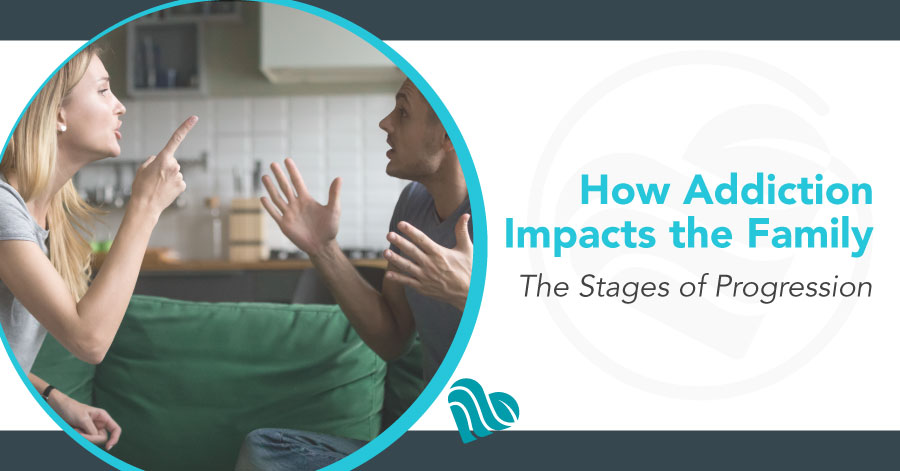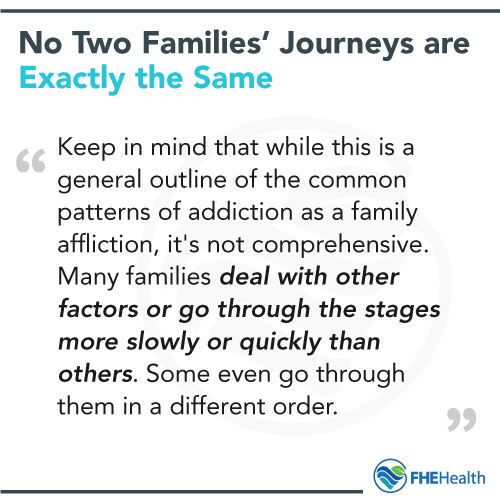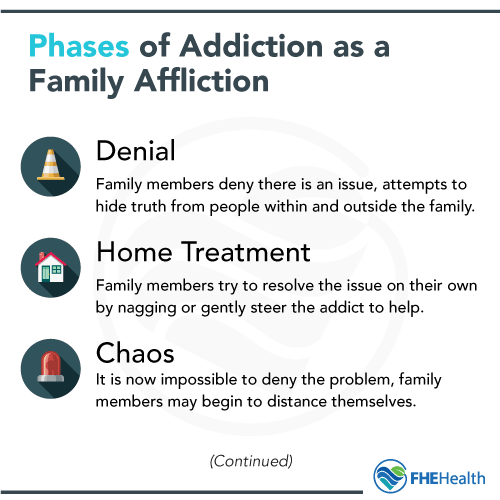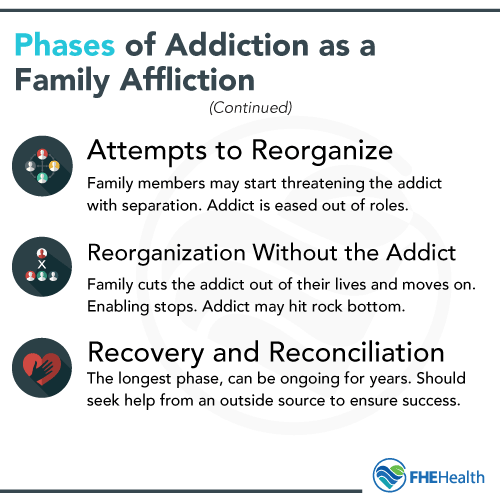
Addiction doesn’t discriminate, and having a cohesive, loving family background doesn’t exclude someone from becoming an addict. While it can be difficult to understand how someone ends up in the throes of addiction with such a positive and supportive family or how a family can end up in the place of cutting the addict off, understanding addiction as a family affliction can provide some insight.
6 Phases of Addiction as a Family Affliction
While every individual and family dynamic is different, addiction follows a common pattern. Here are the six stages of family addiction and the role family members commonly attempt to take on during each.
 1. Denial
1. Denial
This stage is exactly what it sounds like. The family members try to deny that the chemically dependent individual (CDI) has a problem and may start by initially just trying to ignore the addiction completely.
There are usually attempts to hide the addiction, from people within the family but also from people in the outside world. Family members might be concerned about what outside people will think about the family — such as “What must those parents have done to raise a child like that?” — and might experience intense feelings of embarrassment. In this state, the family will usually gladly accept the CDI’s reasons for using drugs or drinking and will only react to inappropriate — whatever that might mean for that family dynamic — drug use.
2. Home Treatment
This stage happens when the addiction has progressed to the point that denial is no longer an option. The family might begin to try to get the CDI to stop using.
Common tactics family members take at this point are to nag or threaten the addict about what will happen if they don’t stop. Family might try to sympathize with the addict as a way to establish common ground and push them toward quitting drug or alcohol use.
During this stage, the family members might start to show signs of the emotional effects of living with an addict. They often start isolating themselves from friends and activities, experience an increase in fear of people finding out and blame themselves for the addict’s problem. Children in these situations might start acting out in response to the family stress, and a spouse or significant other might take on a martyr role. At this point, the total focus of the family is on the addiction.
3. Chaos
When the family gets to this stage, it’s impossible to deny or hide the addiction. The family is often existing from crisis to crisis just trying to survive. The family members might start trying to directly control the addiction by throwing out drugs or alcohol, and there’s a general feeling of skepticism and hopelessness. The spouse in this stage might start avoiding sexual contact with the addict, feel caught between a loyalty to their children and their spouse. They could also start to question their own sanity. It’s common at this stage for the family to seek outside help through programs like Al-Anon and Nar-Anon.
 4. Attempts to Reorganize
4. Attempts to Reorganize
By this point, the spouse (or another family member in the case of an unmarried addict) has taken on most of the family responsibilities, and the addict is eased out of family roles and takes on more of a childlike role. Family members might start threatening to separate from the addict and begin to feel a love/hate conflict in the relationship. Adult family members start to gain more independence, and children are the focus of many decisions. It’s important to understand that these stages aren’t always linear, and this stage, in particular, can be repeated several times or the family might stay in this stage for a while before moving on.
5. Reorganization Without the Addict
This stage happens when the family finally cuts the addict out of their lives and decides to move on without them. This is the point where the family stops enabling the addict. While this stage holds many positive options for the family, including continued movements toward independence and a change in codependent behavior, it’s important to recognize that these positive steps usually only come with outside help and a strong commitment to changing behaviors. Family members who don’t get outside help may find themselves cycling back to old patterns when the addict escalates or hits that rock bottom phase.
6. Recovery and Reconciliation

Discussions at this point surround what led to the addiction and the family separation, how to rebuild trust and how to put the CDI back into the family dynamic. It can be difficult for the spouse to give up the control they’ve developed and be willing to trust and give the CDI more responsibility, but this is an important part of moving forward. Many families will continue to be a part of Al-Anon and Nar-Anon for the support and help in not reverting to codependent or enabling behaviors.
Keep in mind that while this is a general outline of the common patterns of addiction as a family affliction, it’s not comprehensive. Many families deal with other factors or go through the stages more slowly or quickly than others. Some even go through them in a different order.
If you have a loved one who is struggling with an addiction or substance abuse issue and you’re not sure how you can help, FHE Health offers family support services. We work with family members so they can learn how codependency and enabling may be making things worse and how they can stop these behaviors. Contact us today to learn more about our options.
 1. Denial
1. Denial 4. Attempts to Reorganize
4. Attempts to Reorganize





